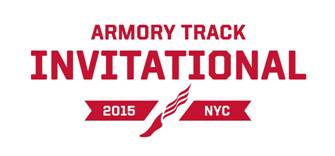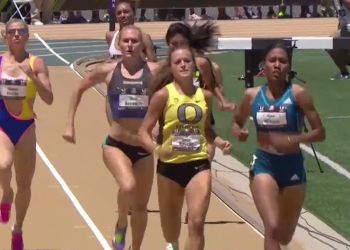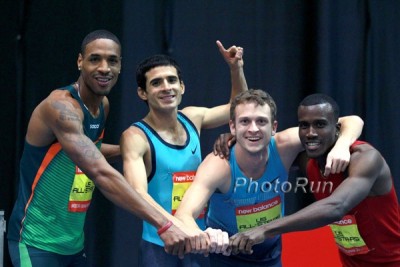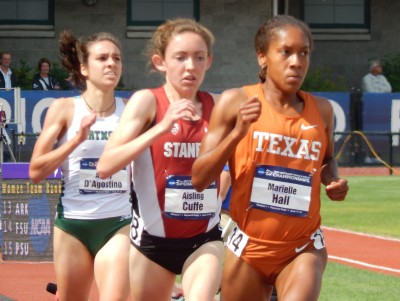Armory Track Invite Preview: A Loaded Women’s 800, Doubles From Galen Rupp & Cam Levins And A DMR World Record Attempt
By LetsRun.com
January 30, 2015
Note: We have updates from the pre-race press conference here. Galen Rupp’s mile/2 mile double is off and he will only run the 2 mile.
The first four weeks of 2015 have seen plenty of college meets, the best among them last weekend’s Rod McCravy Memorial hosted by the University of Kentucky. While there are a plethora of college meets still to come, the next four weeks will see a heavy dose of pro action, starting with this weekend’s Armory Track Invitational at the Armory in New York City and concluding with the USATF Indoor Championships at Boston’s Reggie Lewis Center February 28-March 1.
The major match-ups on Saturday are Ajee Wilson vs. Laura Roesler vs. Natoya Goule vs. Mary Cain in the 800, new pros Abbey D’Agostino and Marielle Hall taking on Jordan Hasay in the 2 mile, Galen Rupp and Cam Levins running the mile/2 mile double and a world record attempt in the men’s distance medley relay. Below, we tell you all you need to know about this weekend’s action at the Armory.
What: Armory Track Invitational
When: Saturday, 4:30-6:30 p.m. ET (live on NBC Sports Network); the rest of the meet (which begins at 10:30 a.m. on Friday) can be streamed on USATF.TV
Where: New Balance Track & Field Center at the Armory, New York
1) Wilson vs. Cain vs. Roesler: The Women’s 800 Is the Race of the Weekend
Nine American women have broken 2:00 for 800 meters over the past two years; a third of them will be in this race, which includes another sub-2:00 woman, two-time NCAA champ Natoya Goule of Clemson and Jamaica. Let’s take them one at a time.
Ajee Wilson emerged as one of the world’s finest 800 runners in 2014. At age 20, she won her second straight U.S. indoor title (she was actually 19 when she did this as she didn’t turn 20 until May), her first U.S. outdoor title and Diamond League races in Glasgow and Monaco. In Monaco she ran a PR of 1:57.67, which wound up as the world’s fastest time in 2014. Because this is the first major race for everyone in this field, we can’t say for sure who is in the best shape at the moment. What is certain is that Wilson is by far the most accomplished woman in the field at this distance. Based on her performance last year, she deserves to enter as the favorite.
It doesn’t seem that way because one just graduated from college and one is entering her third season as a professional, but Laura Roesler is actually two and a half years older than Ajee Wilson. Roesler capped a dominant 2014 — in which she won NCAA indoor and outdoor titles and finished second at USAs in a PB of 1:59.04 — by winning The Bowerman (track and field’s version of the Heisman Trophy) in December and is now in her first full season under coach Rose Monday. It appears that Roesler has been working on her strength, as evidenced by her 4:40.70 mile at Texas A&M two weeks ago. That’s almost identical to her 2014 opener, when she ran 4:40.63 in Seattle. Last year, she followed that performance up with a 2:01.32 800 (she won the race by over five seconds). Now that Roesler is a year stronger and facing better competition, it wouldn’t be a surprise to see her flirt with the 2-minute barrier on Saturday.
Last year, as Roesler was laying waste to the NCAA, many track fans were wishing that Natoya Goule hadn’t sat out the season after transferring from LSU to Clemson. Goule (who swept the NCAA indoor and outdoor titles in 2013 with Roesler second in both races) vs. Roesler would have made for an all-time great showdown, but the two never ended up racing. Well fans don’t have to wait long in 2015 as on Saturday those two will square off for the first time since 2013 outdoor NCAAs (Goule is 3-0). Goule might not have the strength of Roesler right now (she ran just 4:55 for the mile in her opener on January 10th, though she did win the race), but she’s still got good speed, running 53.68 for the open 400 on January 17th.
Finally, there’s 18-year-old Mary Cain. Cain opened her 2015 season up with a 1:30.03/2:07.21 600/800 double in Seattle two weeks ago, which doesn’t tell us a whole lot. In the past, Cain has always been in shape to run fast indoors. She ran 4:24 for the mile and set the world junior record at 1K last year before winning her second straight U.S. title in the 1500. However, Cain’s best event is the 1500 and she may be outmatched here by 800 specialists Wilson, Roesler and Goule.
For Cain, one target worth shooting for is Meskerem Assefa‘s world junior record of 2:01.03 (Cain’s pb is 1:59.51 outdoors). The problem is Cain didn’t best that mark in any of her three 800s last year (SB: 2:01.67). Additionally, indoor races generally don’t go that fast. No one broke 2:00 indoors last year and just seven women broke 2:01; only six broke 2:01 in 2013. Since Cain isn’t even one of the top three women in this race, the odds of her breaking 2:01 and taking down the record seem pretty slim. If you’re hoping for a fast time, this race will probably disappoint you, but the youth — Goule, at 23, is the oldest of the main contenders — and caliber of competition make this a must-watch race.
2) Men’s Distance Medley Relay: Can the World Record Go Down?
Professionals run the indoor distance medley so infrequently that when a meet actually assembles a decent field for the event, the world record is almost automatically in danger. That’s the case on Saturday as the University of Texas’ 2008 world record of 9:25.97 (Kyle Miller 2:54.11, Danzell Fortson 46.90, Jacob Hernandez 1:47.00, Leo Manzano 3:57.96) seems ripe for the taking with the USA and Kenya entering teams that, on paper, should be able to break the record. NJ*NY Track Club also has a team, as do collegiate squads Duke, Ole Miss, Columbia, Wisconsin, Villanova and Princeton.
Let’s compare the Kenyan and American teams to that 2008 Texas squad and see how close they come. For the 1200 leg, we’ve used the athlete’s best indoor mark in the 800, 1500 or mile and converted it to a 1200 using this chart. For the 1600, we used an athlete’s best indoor mile time. Yes, we’re aware that the final leg is a running start and only 1600 meters, but it’s also January (so the athlete likely isn’t in peak mile shape) and this exercise is meant to be an approximation, not an exact decree.
| Texas | USA | Kenya | |
| 1200 | Kyle Miller 2:54.11 | Matthew Centrowitz 2:48.0 (3:51 mile) | Jeremiah Mutai 2:51.0 (1:46.77 800) |
| 400 | Danzell Fortson 46.90 | Mike Berry 45.64 | Carvin Nkanata 46.36 |
| 800 | Jacob Hernandez 1:47.00 | Erik Sowinski 1:46.84 | Alfred Kipketer 1:43.9 (outdoor pb) |
| 1600 | Leo Manzano 3:57.96 | Pat Casey 3:56.28 | Lawi Lalang 3:52.88 |
| Total | 9:25.97 | 9:16.76 | 9:14.14 |
Note: Kipketer has never run an indoor 800 so we used his outdoor PB.
Those times for the USA and Kenya represent absolute best-case scenarios. Kipketer is not running a 1:43.9 (only one man has ever broken 1:44 indoors in an open 800), so that knocks Kenya back a few seconds automatically. Once you factor in that Centrowitz and Mutai’s splits are also a bit optimistic (they assume an equivalent level of performance from event to event and Centrowitz/Mutai are stronger in the mile/800, respectively, than they are in the 1200), and that Casey/Lalang will have a hard time running their mile PBs in a relay, it seems unlikely that anyone will sniff sub-9:20.
But to achieve the world record, a team only needs to break 9:25.97 and that is certainly feasible. The following splits aren’t hard to envision and would get the winning team under the world record:
1200: 2:52.5
400: 47.0
800: 1:48.0
1600: 3:58.0
Time: 9:25.5
Sowinski split 1:46.66 as part of the world record-breaking 4×800 squad in Boston last year so a 1:48.0 seems well within his wheelhouse. Centrowitz ran a 2:19.53/3:58.60 1K/mile double two weeks ago; a 2:52.5 isn’t asking a lot from him. Berry has yet to run a 400 this year (he opened up with a 21.44 200 in Seattle two weeks ago) and Casey has yet to race at all, but their splits are hardly outlandish. The U.S.’s chances at breaking the world record have to be around 50-50.
The biggest reason the record seems likely to go down is that this race will not be a solo effort. The Americans will have to run well to win against a formidable Kenyan team, and the other two pro teams — Ireland (featuring 3:52 indoor miler Ciaran O’Lionaird and 1:46 indoor 800 man Mark English) and NJ*NY TC (featuring Michael Rutt and Kyle Merber, both of whom were on the squad that came within .11 of setting a new world record in the 4×800 in Boston last year) — are both solid. When you’ve got a few guys pushing each other — especially on the mile leg — the odds of a fast time go way up. If there’s a squad that is committed to the record and takes the race out quickly, that 9:25.97 should be history.
And even if they’re not on record pace entering the anchor leg, don’t count out Lalang soloing a quick 1600. Remember indoor NCAAs two years ago, where Lalang won the mile by gapping the field early and running 3:54.74? Perhaps Lalang isn’t in quite that shape right now, but he’s not afraid to push the pace from the front.
3) Women’s 2 Mile: The Top Two From the Class of 2014 Take on NOP
In her first full year as a professional, Jordan Hasay put together a fantastic 2014 season, setting PRs at 1500 (4:07.70), the mile (4:28.37), 2 mile (9:35.05), 5,000 (15:28.56), 10,000 (31:39.67) and coming within 1.21 seconds of her first U.S. outdoor title.
This year, Marielle Hall and Abbey D’Agostino, the two biggest distance names from the NCAA Class of 2014 will be looking to follow a similar path in their first full years as pros. Saturday’s 2 mile will be the first real test of the season for each runner.
D’Agostino had a rocky start to her professional career, as she didn’t race on the track after finishing a surprising third at NCAAs in June. She raced once last fall, taking fourth at the Mayor’s Cup cross country race at Boston’s Franklin Park, before battling a hip injury late in the year that limited her training. Things are looking up already though, as D’Agostino ran 9:00.78 in a mixed 3,000 at Boston University on January 3 and will come into this race off of a stretch of altitude training in Boulder. This race is more of a tuneup for D’Agostino’s main focus (next weekend’s USA XC Championships) so she may not have the finishing speed to contend for the win. But a solid effort here is all that D’Agostino and coach Mark Coogan will hope for heading into USA XC.
Hall kept running after NCAAs and took an impressive third in the 5,000 at USAs. Like D’Agostino, she also ran an XC race last fall (second in the open race at Paul Short) and opened 2015 with a 4:57/9:15 mile/3K double two weeks ago at the Armory.
Which of the two is more likely to make a Hasay-like bump in 2015? D’Agostino more closely fits Hasay’s profile, a mega talent who was a stud for most of her college career (though Hasay was also a stud in HS while D’Agostino didn’t get good until the end of her freshman year at Dartmouth). Hall wasn’t much of a factor until her senior year (her 5k PB after her junior year was 16:22), but her rapid improvement last spring suggests she may have a higher upside than D’Agostino. It will be exciting to see how each woman’s career progresses, with Saturday’s race the first of what should be many encounters as professionals.
Of course, the woman we’ve compared D’Agostino and Hall to is also in Saturday’s race. Hasay demonstrated her indoor form with a 2:41/4:28 1k/mile double two weeks ago in Seattle, beating Nike Oregon Project teammate Treniere Moser in both races (Moser will also race the 2 mile in NYC). On paper, Hasay, D’Agostino and Hall should be the three women battling for the win, but, as with any early-season race, we have so little solid information off which to gauge their current fitness that it’s hard to say who among them should be favored.
4) Easy sweeps for Galen Rupp and Cam Levins? Not so fast
Rupp and Levins will both attempt the mile/2 mile double and with less than 30 minutes between races (the mile is at 5:12 and will thus finish around 5:16; the 2 mile is at 5:44), it’s hard to imagine the duo producing any truly fast times on Saturday. Rupp, of course, owns the American indoor record in the 2 mile (his 8:07.41 in Boston last year), while Levins owns the Canadian record in the event (8:14.69 at the Armory in 2013). Without a mile beforehand, those two could certainly threaten their PBs (initially, this was going to be a world record attempt for Rupp, but that idea was nixed), but that seems unlikely given the short gap between events.
Even running tired, Rupp and Levins have a good shot to go 1-2 in the 2 mile; Nike’s Trevor Dunbar (13:26 5K PB) is likely their biggest competition, though Ben Blankenship (fifth at USA indoors last year, 7:46 3K PB) could also threaten if he’s in shape.
A 1-2 finish in the mile is a bigger ask. Rupp, who will make his 2015 debut on Saturday, has proven that when he’s in shape, he’s an elite miler (recall that he ran the fifth-fastest indoor mile ever two years ago). Rupp shouldn’t have much of a problem with most of the field, but there is one guy who could pose a threat: Scotland’s Chris O’Hare (now based in Boston under Terrence Mahon). O’Hare is an accomplished international miler (2013 World Championship finalist, bronze medal at last year’s Euro Champs) with a quick 3:52.98 PB. O’Hare has raced just once this year (a 1:52.69 800 last week) so, like Rupp, it’s hard to tell where he’s at fitness-wise. But if he’s on his game, he could challenge Rupp for the win. Certainly he’s a major threat to Levins, who, despite a 3:57.16 PB (he ran 3:58.75 two weeks ago in Seattle), doesn’t have Rupp’s speed.
More: Discuss this meet in our fan forum. We’ve started a new thing this week with a thread devoted to the meet of the week: MB: This Sat Armory Track Invite: USA Men’s DMR WR Attempt, Wilson v Cain v Roesler @800, Rupp Double- 2 Mile WR Attempt Off.
Note: We have updates from the pre-race press conference here. Galen Rupp’s mile/2 mile double is off and he will only run the 2 mile.






